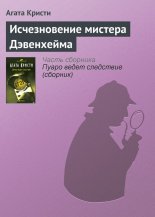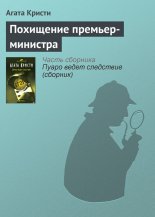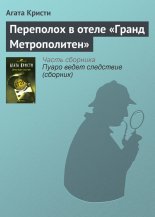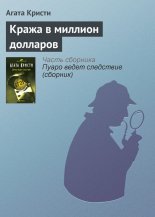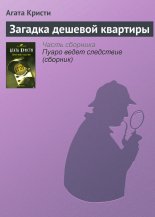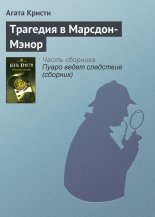Убийства по алфавиту Кристи Агата
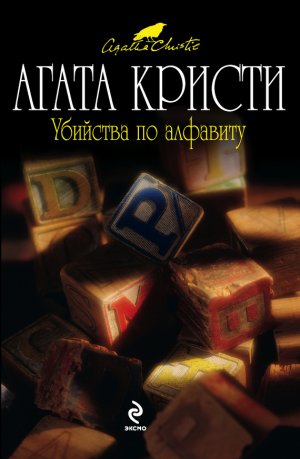
"Comment (фр. как)? Nine (девять)? Nine what (девять чего)?"
"Nothing (ничего) — just an expression (просто выражение). I meant a fellow (я подразумевал человека; to mean — иметь в виду; подразумевать) who was tight (который напился; tight — тесный; сжатый; раз. пьяный). No, damn it (нет, проклятье: «прокляни это»), a fellow (человека) who had had a spot too much to drink (который принял слишком много: «у которого было больше порций /спиртного/, чем он мог выпить»)."
"Merci, Hastings (благодарю, Гастингс) — the expression 'tight' I am acquainted with it (с выражением «напился» я знаком). As you say (как вы говорите), there may be nothing more to it than that (за этим, возможно, больше ничего нет: «там, возможно, больше ничего в этом, чем это»)."
"But you think there is (но вы думаете, что есть)?" I asked (я спросил), struck by the dissatisfaction of his tone (пораженный недовольством его тона; to strike — бить, ударять; поражать, производить впечатление; to satisfy — удовлетворять; соответствовать).
Poirot shook his head doubtfully (Пуаро с сомнением покачал головой; doubt — сомнение; to shake — трясти/сь/; встряхивать; качать/ся/), but he did not speak (но он /ничего/ не сказал).
tight [taIt], acquaint [@'kweInt], doubtfully ['dautfUlI]
"Comment? Nine? Nine what?"
"Nothing — just an expression. I meant a fellow who was tight. No, damn it, a fellow who had had a spot too much to drink."
"Merci, Hastings — the expression 'tight' I am acquainted with it. As you say, there may be nothing more to it than that."
"But you think there is?" I asked, struck by the dissatisfaction of his tone.
Poirot shook his head doubtfully, but he did not speak.
"What have you done about it?" I inquired (что вы предприняли по этому /поводу/? — поинтересовался я; to inquire — осведомляться, справляться, спрашивать, узнавать).
"What can one do (что можно сделать)? I showed it to Japp (я показал его Джеппу). He was of the same opinion as you (он был того же мнения, что и вы) — a stupid hoax (глупая шутка) — that was the expression he used (это то выражение, /которое/ он использовал). They get these things every day at Scotland Yard[2] (они получают такие вещи каждый день в Скотланд-Ярде). I, too, have had my share (я тоже имел /такие на/ свою долю) —"
"But you take this one seriously (но это вы принимаете всерьез)?
Poirot replied slowly (Пуаро медленно ответил). "There is something about that letter, Hastings (там есть что-то в этом письме, Гастингс), that I do not like (что мне не нравится)."
In spite of myself (не смотря на мое /мнение/), his tone impressed me (его тон впечатлил меня). "You think (вы думаете) — what (что)?"
inquire [Ink'waI@], Scotland Yard ['skOtl@nd 'jA:d], share [SE@]
"What have you done about it?" I inquired.
"What can one do? I showed it to Japp. He was of the same opinion as you — a stupid hoax — that was the expression he used. They get these things every day at Scotland Yard. I, too, have had my share —"
"But you take this one seriously?
Poirot replied slowly. "There is something about that letter, Hastings, that I do not like ."
In spite of myself, his tone impressed me. "You think — what?"
He shook his head (он покачал головой; to shake), and picking up the letter (и подобрав письмо), put it away again in the desk (снова убрал его в стол; to put — класть).
"If you really take it seriously (если вы действительно принимаете его всерьез), can't you do something (/разве/ вы не можете ничего сделать)?" I asked (спросил я). "As always (как обычно), the man of action (человек действия)! But what is there to do (но что здесь поделать)? The county police have seen the letter (полиция графства уже видела письмо; to see) but they, too, do not take it seriously (но они тоже не принимают его всерьез). There are no fingerprints on it (на нем нет отпечатков пальцев). There are no local clues (там нет прямых указаний; local — местный, локальный; clue — клубок, моток; ключ /к разгадке чего-л./; улика; ход мыслей) as to the possible writer (на возможного автора /письма/: «писателя»)."
county ['kaUntI], fingerprint ['fINg@prInt], clue [klu:]
He shook his head, and picking up the letter, put it away again in the desk.
"If you really take it seriously, can't you do something?" I asked. "As always, the man of action! But what is there to do? The county police have seen the letter but they, too, do not take it seriously. There are no fingerprints on it. There are no local clues as to the possible writer."
"In fact (фактически) there is only your own instinct (это только ваш инстинкт)?"
"Not instinct, Hastings (не инстинкт, Гастингс). Instinct is a bad word (инстинкт — это неподходящее слово: «плохое слово»). It is my knowledge (это мои знания) — my experience (мой опыт) — that tells me (который говорит мне) that something about that letter is wrong (что с этим письмом что-то не так) — "
He gesticulated (он стал жестикулировать) as words failed him (когда слова покинули его), then shook his head again (затем снова покачал головой).
"I may be making the mountain out of the anthill (возможно, я делаю из мухи слона: «гору из муравейника»). In any case (в любом случае) there is nothing to be done but wait (ничего не остается делать, только ждать)."
"Well (так), the 21st is Friday (двадцать первое — это пятница). If a whacking great robbery takes place near Andover then (если грандиозное ограбление произойдет вблизи Эндовера, тогда; whacking — разг. большой, огромный; to whack — ударять; наносить звонкие удары) — "
knowledge ['nOlIdZ], gesticulate [dZe'stIk@leIt] [dZe'stIkjuleIt], whacking ['w&kIN]
"In fact there is only your own instinct?"
"Not instinct, Hastings. Instinct is a bad word. It is my knowledge — my experience — that tells me that something about that letter is wrong — "
He gesticulated as words failed him, then shook his head again.
"I may be making the mountain out of the anthill. In any case there is nothing to be done but wait."
"Well, the 21st is Friday. If a whacking great robbery takes place near Andover then — "
"Ah, what a comfort that would be (ах, каким утешением это бы было; comfort — утешение, успокоение)!"
"A comfort?" I stared (утешением? — я уставился /на него/). The word seemed to be a very extraordinary one to use (это слово казалось неуместным: «это слово, казалось, было очень странным, чтобы его использовать»). "A robbery may be a thrill (ограбление может вызвать дрожь: «ограбление может быть дрожью»; thrill — нервная дрожь, трепет; что-л. волнующее, захватывающее) but it can hardly be a comfort (но едва ли может быть утешением)!" I protested (запротестовал я).
Poirot shook his head energetically (Пуаро энергично покачал головой).
"You are in error, my friend (вы заблуждаетесь: «вы в заблуждении», мой друг). You do not understand my meaning (вы не понимаете, что я имею в виду; meaning — смысл, значение). A robbery would be a relief (ограбление было бы облегчением) since it would dispossess my mind of the fear of something else (так как оно бы освободило мой ум от страха перед чем-то еще; mind — разум; ум; мышление; память)."
"Of what (перед чем)?"
"Murder," said Hercule Poirot (/перед/ убийством, — сказал Эркюль Пуаро).
thrill [TrIl], relief [rI'li:f], murder ['m@:d@]
"Ah, what a comfort that would be!"
"A comfort?" I stared. The word seemed to be a very extraordinary one to use. "A robbery may be a thrill but it can hardly be a comfort!" I protested.
Poirot shook his head energetically.
"You are in error, my friend. You do not understand my meaning. A robbery would be a relief since it would dispossess my mind of the fear of something else."
"Of what?"
"Murder," said Hercule Poirot.
II. (Not from Captain Hastings' Personal Narrative)
(не из личного повествования капитана Гастингса)
Mr. Alexander Bonaparte Cust rose from his seat (мистер Александр Бонапарт Каст поднялся со своего места; to rise — подниматься, вставать) and peered nearsightedly round the shabby bedroom (и близоруко оглядел захудалую спальню; near sight — близорукость). His back was stiff from sitting in a cramped position (его спина затекла от сидения в неудобном положении: «его спина была негибкой от сидения в скрученном положении») and as he stretched himself to his full height (и когда он потянулся во весь рост: «в полную высоту») an onlooker would have realized (/посторонний/ наблюдатель мог бы понять; to realize — понимать, осознавать) that he was, in reality (что он был, на самом деле), quite a tall man (достаточно высоким человеком). His stoop (его сутулость) and his nearsighted peering (и близорукий взгляд) gave a delusive impression (создавали обманчивое впечатление; to give — давать; даровать).
nearsighted ['nI@saItId], height [haIt], delusive [dI'lu:sIv]
Mr. Alexander Bonaparte Cust rose from his seat and peered nearsightedly round the shabby bedroom. His back was stiff from sitting in a cramped position and as he stretched himself to his full height an onlooker would have realized that he was, in reality, quite a tall man. His stoop and his nearsighted peering gave a delusive impression.
Going to a well-worn overcoat (подойдя к сильно изношенному пальто; to wear — носить) hanging on the back of the door (висящему на задней /стороне/ двери), he took from the pocket a packet of cheap cigarettes and some matches (он вынул из кармана пачку дешевых сигарет и спички). He lit a cigarette (он прикурил сигарету; to light — зажигать; освещать) and then returned to the table (и затем вернулся к столу) at which he had been sitting (за которым он сидел). He picked up a railway guide (он поднял железнодорожный справочник) and consulted it (и сверился с ним), then he returned to the consideration (затем он вернулся к изучению; to consider — рассматривать; обдумывать; считать) of a typewritten list of names (напечатанного списка имен; to typewrite). With a pen (ручкой), he made a tick (он поставил галочку; to make) against one of the first names on the list (напротив одного из первых имен в списке).
It was Thursday, June 20th (это был четверг, двадцатое июня).
cheap [tSi:p], guide [gaId], Thursday ['T@:zdI]
Going to a well-worn overcoat hanging on the back of the door, he took from the pocket a packet of cheap cigarettes and some matches. He lit a cigarette and then returned to the table at which he had been sitting. He picked up a railway guide and consulted it, then he returned to the consideration of a typewritten list of names. With a pen, he made a tick against one of the first names on the list.
It was Thursday, June 20th.
III. Andover
(Эндовер)
I had been impressed at the time (в то время я был под впечатлением: «я в то время был впечатлен») by Poirot's forebodings about the anonymous letter (дурных предчувствий Пуаро относительно анонимного письма) he had received (/которое/ он получил), but I must admit (но я должен признать) that the matter had passed from my mind (что это дело вылетело у меня из головы) when the 21st actually arrived (когда действительно наступило двадцать первое) and the first reminder of it came with a visit (и первое напоминание о нем пришло вместе с визитом; to remind — напоминать) paid to my friend by Chief Inspector Japp of Scotland Yard (нанесенным моему другу главным инспектором Скотланд-Ярда Джеппом; to pay a visit). The C.I.D[3]. inspector had been known to us for many years (с инспектором Управления уголовных расследований мы были знакомы много лет: «инспектор Управления уголовных расследований был знаком нам много лет»; to know — знать) and he gave me a hearty welcome (и он меня сердечно встретил: to give a welcome — оказать прием, встретить).
anonymous [@'nOnIm@s], receive [rI'si:v], hearty ['hA:tI]
I had been impressed at the time by Poirot's forebodings about the anonymous letter he had received, but I must admit that the matter had passed from my mind when the 21st actually arrived and the first reminder of it came with a visit paid to my friend by Chief Inspector Japp of Scotland Yard. The C.I.D. inspector had been known to us for many years and he gave me a hearty welcome.
"Well, I never (не может быть: «ну, я никогда»)," he exclaimed (он воскликнул). "If it isn't Captain Hastings (неужели это капитан Гастингс: «если это не капитан Гастингс») back from the wilds (вернулся из диких краев: «назад из дебрей»; the wilds — пустыня, дебри; дикая местность) of the what do you call it (как вы это там называете)! Quite like old days seeing you here with Monsieur Poirot (почти как в старые дни, видеть вас здесь с мсье Пуаро). You're looking well, too (вы хорошо выглядите к тому же). Just a little bit thin on top, eh (только немного лысеете, а; to be thin on top — неформ. лысеть: «быть редким наверху»)? Well, that's what we're all coming to (ну, это то, к чему все мы придем). I'm the same (со мной тоже самое)."
I winced slightly (я слегка вздрогнул; to wince — вздрагивать, морщиться /напр., от боли/). I was under the impression (я был под впечатлением) that owing to the careful way (что благодаря той аккуратности: «благодаря аккуратному способу») I brushed my hair across the top of my head (/с которой/ я зачесывал волосы поперек макушки: «вершины головы») that thinness (та лысоватость) referred to by Japp (/о которой/ упомянул Джепп) was quite unnoticeable (была весьма незаметна; to notice — замечать). However (однако), Japp had never been remarkable for tact (Джепп никогда не отличался тактичностью; remarkable — замечательный, выдающийся; знаменитый) where I was concerned (в том, что касалось меня) so I put a good face upon it (так что, я сделал хорошую мину: «я надел довольное лицо» по этому /поводу/) and agreed that (и согласился) we were none of us getting any younger (что никто из нас не становится моложе).
monsieur [m@'sj@:], exclaim [Iks'kleIm], concern [k@n's@:n]
"Well, I never," he exclaimed. "If it isn't Captain Hastings back from the wilds of the what do you call it! Quite like old days seeing you here with Monsieur Poirot. You're looking well, too. Just a little bit thin on top, eh? Well, that's what we're all coming to. I'm the same."
I winced slightly. I was under the impression that owing to the careful way I brushed my hair across the top of my head that thinness referred to by Japp was quite unnoticeable. However, Japp had never been remarkable for tact where I was concerned so I put a good face upon it and agreed that we were none of us getting any younger.
"Except Monsieur Poirot here (вот, кроме мсье Пуаро; here — здесь усил. вот)," said Japp. "Quite a good advertisement for a hair tonic (весьма хорошей рекламой тоника для волос), he'd be (он мог бы быть). Face fungus sprouting finer than ever (растительность на лице растет лучше, чем никогда; fungus — грибок; плесень; неформ. растительность; to sprout — давать ростки; отращивать). Coming out into the limelight, too (к тому же выходит в свет софитов; limelight — друммондов свет /для освещения сцены/; перен. центр внимания), in his old age (в его/-то/ почтенном возрасте). Mixed up in all the celebrated cases of the day (замешан во всех известных случаях дня). Train mysteries (загадки в поезде), air mysteries (загадки в воздухе), high society deaths (смерти в высшем свете: «обществе») — oh, he's here (о, он здесь), there and everywhere (там и везде). Never been so celebrated (никогда не был таким известным) as since he retired (как с тех пор, как вышел в отставку)."
"I have already told Hastings (я уже говорил Гастингсу; to tell — говорить, рассказывать) that I am like the Prima Donna (что я — как примадонна) who makes always one more appearance (которая всегда выступает: «появляется» еще один раз)," said Poirot, smiling (улыбаясь).
"Shouldn't wonder (не стоило бы удивляться) if you ended (если бы вы закончили) by detecting your own death (расследуя собственную смерть)," said Japp, laughing heartily (сердечно смеясь). "That's an idea, that is (это идея, точно). Ought to be put in a book (должна бы войти в книгу: «следовала бы быть положенной в книгу»)."
advertisement [@d'v@:tIsm@nt], fungus ['fVNg@s], society [s@'saI@tI]
"Except Monsieur Poirot here," said Japp. "Quite a good advertisement for a hair tonic, he'd be. Face fungus sprouting finer than ever. Coming out into the limelight, too, in his old age. Mixed up in all the celebrated cases of the day. Train mysteries, air mysteries, high society deaths — oh, he's here, there and everywhere. Never been so celebrated as since he retired."
"I have already told Hastings that I am like the Prima Donna who makes always one more appearance," said Poirot, smiling.
"Shouldn't wonder if you ended by detecting your own death," said Japp, laughing heartily. "That's an idea, that is. Ought to be put in a book."
"It will be Hastings who will have to do that (Гастингсу придется это сделать: «это будет Гастингс, которому придется сделать это»)," said Poirot, twinkling at me (подмигивая мне).
"Ha ha (ха-ха)! That would be a joke, that would (то была бы шутка, точно: «то была бы»)," laughed Japp (засмеялся Джепп).
I failed to see (мне не удалось понять) why the idea was so extremely amusing (почему эта идея была такой крайне забавной), and in any case (и, в любом случае) I thought the joke was in poor taste (я подумал, что шутка была дурного вкуса; to think — думать, считать). Poirot, poor old chap (бедный старина: «бедный старый парень»), is getting on (стареет; to get on — продолжать; стареть). Jokes about his approaching demise can hardly be agreeable to him (шутки о его приближающейся кончине едва ли приятны ему; agreeable — приятный, милый; приемлемый).
twinkle [twINkl], approach [@'pr@UtS], demise [dI'maIz]
"It will be Hastings who will have to do that," said Poirot, twinkling at me.
"Ha ha! That would be a joke, that would," laughed Japp.
I failed to see why the idea was so extremely amusing, and in any case I thought the joke was in poor taste. Poirot, poor old chap, is getting on. Jokes about his approaching demise can hardly be agreeable to him.
Perhaps my manner showed my feelings (вероятно, мой вид выдавал мои чувства: «моя манера показывала мои чувства»), for Japp changed the subject (так как Джепп сменил тему).
"Have you heard about Monsieur Poirot's anonymous letter?" he asked (вы слышали об анонимном письме мсье Пуаро? — спросил он).
"I showed it to Hastings the other day," said my friend (я на днях показывал его Гастингсу, — сказал мой друг).
"Of course," I exclaimed (конечно, — воскликнул я). "It had quite slipped my memory (оно совершенно вылетело из моей памяти; to slip — скользить). Let me see (послушайте: «позвольте мне посмотреть»), what was the date mentioned (какое число было упомянуто)?"
"The 21st ," said Japp (двадцать первое). "That's what I dropped in about (вот почему я заскочил; to drop — капать; ронять; to drop in — зайти, заглянуть, заскочить). Yesterday was the 21st (вчера было двадцать первое) and just out of curiosity I rang up Andover last night (и просто из любопытства я вчера вечером позвонил в Эндовер; to ring). It was a hoax all right (это все точно выдумка). Nothing doing (ничего /не/ происходит: «ничего /не/ делается»). One broken shop window (одна разбитая витрина магазина; to break — ломать; разбивать) — kid throwing stones (ребенок кидал камни) — and a couple of drunk (парочка пьяниц; to drink — пить) and disorderlies (и нарушений общественного порядка). So just for once (так на этот раз) our Belgian friend was barking up the wrong tree (наш бельгийский друг ошибся: «лаял не на то дерево»)."
disorderly [dIs'O:rd(@)lI], Belgian ['beldZI@n], wrong [rON]
Perhaps my manner showed my feelings, for Japp changed the subject.
"Have you heard about Monsieur Poirot's anonymous letter?" he asked.
"I showed it to Hastings the other day," said my friend.
"Of course," I exclaimed. "It had quite slipped my memory. Let me see, what was the date mentioned?"
"The 21st," said Japp. "That's what I dropped in about. Yesterday was the 21st and just out of curiosity I rang up Andover last night. It was a hoax all right. Nothing doing. One broken shop window — kid throwing stones — and a couple of drunk and disorderlies. So just for once our Belgian friend was barking up the wrong tree."
"I am relieved (я /чувствую/ облегчение), I must confess (я должен признаться)," acknowledged Poirot (признал Пуаро).
"You'd quite got the wind up about it (вы достаточно струхнули по этому /поводу/: «вы достаточно подняли ветер об этом»; to get the wind up — утратить спокойствие, испугаться), hadn't you (не так ли)?" said Japp affectionately (мягко сказал Джепп; affectionately — нежно, с выражением привязанности; affection — любовь, чувство близости, привязанность). "Bless you (благослови вас /Господь/), we get dozens of letters like that coming in every day (мы получаем дюжины таких писем каждый день)! People with nothing better to do (людям, /которым/ нечем больше заняться) and a bit weak in the top storey (и больные на голову: «и немного слабые на верхний этаж») sit down and write 'em (садятся и пишут их; 'em — them). They don't mean any harm (они не имеют в виду никакого вреда)! Just a kind of excitement (это просто развлечение: «это просто вид эмоционального волнения»).''
"I have indeed been foolish to take the matter so seriously," said Poirot (я действительно был глуп, принимая это дело столь серьезно). "It is the nest of the horse (это лошадиное гнездо) that I put my nose into there (в которое я сунул нос)."
"You're mixing up mares and wasps," said Japp (вы путаете кобыл и ос, — сказал Джепп; hornets' nest — осиное гнездо).
"Pardon (прошу прощения)?"
acknowledge [@k'nOlIdZ], dozen ['dVz(@)n], wasp [wOsp]
"I am relieved, I must confess," acknowledged Poirot.
"You'd quite got the wind up about it, hadn't you?" said Japp affectionately. "Bless you, we get dozens of letters like that coming in every day! People with nothing better to do and a bit weak in the top storey sit down and write 'em. They don't mean any harm! Just a kind of excitement.''
"I have indeed been foolish to take the matter so seriously," said Poirot. "It is the nest of the horse that I put my nose into there."
"You're mixing up mares and wasps," said Japp.
"Pardon?"
"Just a couple of proverbs (просто пара пословиц). Well, I must be off (что ж, мне нужно идти; to be off — уходить). Got a little business in the next street to see to (должен присмотреть за небольшим делом на соседней улице: «имею небольшое дело присмотреть») — receiving stolen jewelry (получение украденных драгоценностей; to steal — красть). I thought (я подумал; to think) I'd just drop in on my way (я просто заскочу по дороге) and put your mind at rest (и успокою вас: «положу ваш ум в отдых»). Pity to let those grey cells function unnecessarily (жаль позволять тем серым клеточкам работать без необходимости; necessary — необходимый)."
With which words and a hearty laugh (с этими словами и сердечным смехом), Japp departed (Джепп удалился).
"He does not change much (он не слишком меняется), the good Japp (добряк Джепп), eh (а)?" asked Poirot (спросил Пуаро).
"He looks much older," I said (он выглядит гораздо старше). "Getting as grey as a badger (седеет, как барсук: «становится таким седым, как барсук»)," I added vindictively (добавил я мстительно).
Poirot coughed and said (Пуаро кашлянул и сказал): "You know, Hastings (вы знаете, Гастингс), there is a little device (есть маленькое приспособление) — my hairdresser is a man of great ingenuity (мой парикмахер — человек великой гениальности) — one attaches it to the scalp (это прикрепляется к коже головы) and brushes one's own hair over it (и волосы зачесываются поверх него) — it is not a wig (это не парик), you comprehend (вы понимаете) — but — (но)"
jewelry ['dZu:@lrI], vindictively [vIn'dIktIvlI], ingenuity [,IndZI'nju:@tI]
"Just a couple of proverbs. Well, I must be off. Got a little business in the next street to see to — receiving stolen jewelry. I thought I'd just drop in on my way and put your mind at rest. Pity to let those grey cells function unnecessarily."
With which words and a hearty laugh, Japp departed.
"He does not change much, the good Japp, eh?" asked Poirot.
"He looks much older," I said. "Getting as grey as a badger," I added vindictively.
Poirot coughed and said: "You know, Hastings, there is a little device — my hairdresser is a man of great ingenuity — one attaches it to the scalp and brushes one's own hair over it — it is not a wig, you comprehend — but — "
"Poirot," I roared (Пуаро, — взревел я). "Once and for all (раз и навсегда = никогда в жизни) I will have nothing to do (я не буду иметь ничего общего) with the beastly inventions of your confounded hairdresser (с гадкими изобретениями вашего проклятого парикмахера; beast — зверь, животное; to invent — изобретать; to confound — мешать; смущать; проклинать). What's the matter with the top of my head (что за дело с моей макушкой)?"
"Nothing (ничего) — nothing at all (совершенно ничего)."
"It's not as though I were going bald (это не так, как будто бы я лысею = уж не лысею ли я/ведь я же не лысею)."
"Of course not (конечно нет)! Of course not!"
"The hot summers out there (жаркое лето там /в Америке/) naturally cause the hair to fall out a bit (естественно, заставляет волосы немного выпадать). I shall take back a really good hair tonic (я возьму /с собой/ назад действительно хорошее средство для укрепления волос)."
"Precisement (фр. именно так: «точно»)."
roar [rO:], confounded [k@n'faUndId], tonic ['tOnIk]
"Poirot," I roared. "Once and for all I will have nothing to do with the beastly inventions of your confounded hairdresser. What's the matter with the top of my head?"
"Nothing — nothing at all."
"It's not as though I were going bald."
"Of course not! Of course not!"
"The hot summers out there naturally cause the hair to fall out a bit. I shall take back a really good hair tonic."
"Precisement."
"And, anyway (и, в любом случае), what business is it of Japp's (какое дело до этого Джеппу)? He always was an offensive kind of devil (он всегда был любителем сказать неприятное: «оскорбительным типом дьявола»; offensive — обидный, оскорбительный; неприятный, противный; to offend — оскорблять, обижать). And no sense of humour (и никакого чувства юмора). The kind of man (тот тип человека) who laughs (который смеется) when a chair is pulled away (когда стул выдергивают) just as a man is about to sit down (как раз тогда, когда человек собирается сесть; to be about to do smth. — собираться что-то сделать)."
"A great many people would laugh at that (большое количество людей смеются над этим)."
"It's utterly senseless (это совершенно бессмысленно; utter — полный; совершенный; крайний)."
"From the point of view of the man about to sit (с точки зрения человека, /который/ собирается сесть), certainly it is (конечно, так /оно и есть/)."
offensive [@'fensIv], humour [hju:m@], utterly ['Vt@lI]
"And, anyway, what business is it of Japp's? He always was an offensive kind of devil. And no sense of humour. The kind of man who laughs when a chair is pulled away just as a man is about to sit down."
"A great many people would laugh at that."
"It's utterly senseless."
"From the point of view of the man about to sit, certainly it is."
"Well," I said (хорошо), slightly recovering my temper (слегка приходя в себя: «слегка возвращая самообладание»; to recover — вновь обретать; возвращать, получать обратно). (I admit (я признаю) that I am touchy about the thinness of my hair (что я чувствителен в отношении густоты моих волос: «тонкости моих волос»).) "I'm sorry (мне очень жаль) that anonymous letter business came to nothing (что дело по анонимному письму ни к чему не привело)."
"I have indeed been in the wrong over that (я действительно был неправ в этом: «я действительно был в неправильности об этом»). About that letter (что касается письма), there was (оно было: «там был»), I thought (я подумал), the odour of the fish (с душком: «запах рыбы»). Instead a mere stupidity (вместо /этого/ просто глупость). Alas (увы), I grow old and suspicious (я становлюсь старым и подозрительным) like the blind watchdog (как слепой сторожевой пес) who growls (который рычит) when there is nothing there (когда ничего /такого/ нет)."
odour ['O:d@], blind [blaInd], growl [graUl]
"Well," I said, slightly recovering my temper. (I admit that I am touchy about the thinness of my hair.) "I'm sorry that anonymous letter business came to nothing."
"I have indeed been in the wrong over that. About that letter, there was, I thought, the odour of the fish. Instead a mere stupidity. Alas, I grow old and suspicious like the blind watchdog who growls when there is nothing there."
"If I'm going to cooperate with you (если я собираюсь сотрудничать с вами), we must look about for some other 'creamy' crime (мы должны поискать какое-нибудь другое «сливочное» преступление; to look about — оглядываться; искать)," I said with a laugh (я сказал со смешком).
"You remember your remark of the other day (вы помните ваше замечание, /которое вы сказали/ на днях)? If you could order a crime (если бы вы могли заказать преступление) as one orders a dinner (как заказывают обед), what would you choose (что бы вы выбрали)?"
I fell in with his humour (я поддержал его шутку; to fall in with — поддерживать; подходить; соответствовать). "Let me see now (так, дайте мне подумать). Let's review the menu (давайте посмотрим меню). Robbery (кража)? Forgery (подлог)? No, I think not (нет, я думаю, что нет). Rather too vegetarian (слишком по-вегетариански). It must be murder (это должно быть убийство) — red-blooded murder (красно-кровавое = самое натуральное убийство) — with trimmings (с гарниром; trimming — украшение; отделка; гарнир), of course (конечно)."
"Naturally (естественно). The hors d'uvres (фр. закуски)."
cooperate [k@U'Op(@)reIt], forgery ['fO:dZ(@)rI], blood [blVd]
"If I'm going to cooperate with you, we must look about for some other 'creamy' crime," I said with a laugh.
"You remember your remark of the other day? If you could order a crime as one orders a dinner, what would you choose?"
I fell in with his humour. "Let me see now. Let's review the menu. Robbery? Forgery? No, I think not. Rather too vegetarian. It must be murder — red-blooded murder — with trimmings, of course."
"Naturally. The hors d'uvres."
"Who shall the victim be (кто будет жертвой) — man or woman (мужчина или женщина)? Man, I think (мужчина, я думаю). Some bigwig (какая-нибудь «шишка»). American millionaire (американский миллионер). Prime Minister (премьер-министр). Newspaper proprietor (владелец газеты). Scene of the crime (место совершения преступления) — well, what's wrong with the good old library (ну, чем плоха /например/ старая добрая библиотека)?"
"Nothing like it for atmosphere (/нет/ ничего подобного ей для атмосферы = невозможно представить что либо лучшее для атмосферы). As for the weapon (что касается оружия) — well, it might be a curiously twisted dagger (ну, это может быть необычно изогнутый кинжал) — or some blunt instrument (или какой-нибудь тупой предмет) — a carved stone idol (резной каменный идол) —"
Poirot sighed (Пуаро вздохнул).
"Or, of course (или, конечно)," I said, "there's poison (есть яд) — but that's always so technical (ну, это всегда так сложно; technical — технический; промышленный; специальный). Or a revolver shot (или револьверный выстрел) echoing in the night (эхом /гремящий/ в ночи). Then there must be a beautiful girl (потом, там должна быть красивая девушка) or two (или две) —»
"With auburn hair," murmured my friend (с каштановыми волосами, — пробормотал мой друг).
proprietor [pr@ 'praI@t@], dagger ['d&g@], auburn ['O:b@n]
"Who shall the victim be — man or woman? Man, I think. Some bigwig. American millionaire. Prime Minister. Newspaper proprietor. Scene of the crime — well, what's wrong with the good old library?"
"Nothing like it for atmosphere. As for the weapon — well, it might be a curiously twisted dagger — or some blunt instrument — a carved stone idol —"
Poirot sighed.
"Or, of course," I said, "there's poison — but that's always so technical. Or a revolver shot echoing in the night. Then there must be a beautiful girl or two —"
"With auburn hair," murmured my friend.
"Your same old joke (та ваша старая шутка). One of the beautiful girls (одну из красивых девушек), of course (конечно), must be unjustly suspected (должны несправедливо подозревать; just — справедливый) — and there's some misunderstanding between her and the young man (там какое-нибудь непонимание между ней и молодым человеком; to understand — понимать). And then, of course (и тогда, конечно), there must be some other suspects (должны быть какие-нибудь еще подозреваемые) — an older woman (пожилая женщина), dangerous type (опасный тип; danger — опасность) — and some friend (или какой-нибудь друг) or rival of the dead man's (или соперник убитого: «мертвого человека») — and a quiet secretary (и тихий секретарь) — dark horse (темная лошадка) — and a hearty man with a bluff manner (и общительный малый с грубоватыми манерами) — and a couple of discharged servants (и парочка уволенных слуг) or gamekeepers (или егерей; gamekeeper — лесник, егерь, охраняющий дичь /от браконьеров и т.п./; game — дичь, зверь, добытый на охоте) or something (или что-нибудь) — and a damn fool of a detective rather like Japp (и чертов дурак-детектив, такой как Джепп) — and well (и, пожалуй) — that's about all (вроде бы и все)."
dangerous ['deIndZ(@)r@s], rival [raIv(@)l], quiet [kwaI@t]
"Your same old joke. One of the beautiful girls, of course, must be unjustly suspected — and there's some misunderstanding between her and the young man. And then, of course, there must be some other suspects — an older woman, dangerous type — and some friend or rival of the dead man's — and a quiet secretary — dark horse — and a hearty man with a bluff manner — and a couple of discharged servants or gamekeepers or something — and a damn fool of a detective rather like Japp — and well — that's about all."
"That is your idea of the cream, eh (это ваше представление о сливках, а)?"
"I gather (я делаю вывод, что) you don't agree (вы не согласны)."
Poirot looked at me sadly (Пуаро грустно посмотрел на меня). "You have made there a very pretty rsum of nearly all the detective stories (вы сделали здесь замечательное резюме приблизительно всех детективных историй) that have ever been written (которые когда-либо были написаны)."
"Well," I said (хорошо, — сказал я). "What would you order (что бы вы заказали)?"
Poirot closed his eyes (Пуаро закрыл глаза) and leaned back in his chair (и откинулся назад в своем кресле). His voice came purringly from between his lips (его голос мурлыкал: «выходил, мурлыкая, из его губ»).
rsum ['rezju(:)meI], lean [li:n], purringly ['p@:rINlI]
"That is your idea of the cream, eh?"
"I gather you don't agree."
Poirot looked at me sadly. "You have made there a very pretty rsum of nearly all the detective stories that have ever been written."
"Well," I said. "What would you order?"
Poirot closed his eyes and leaned back in his chair. His voice came purringly from between his lips.
"A very simple crime (очень простое убийство). A crime with no complications (убийство без сложностей). A crime of quiet domestic life (убийство из тихой домашней жизни), very unimpassioned (очень бесстрастное; passion — страсть) — very intime (очень фр. интимное)."
"How can a crime be intime (как преступление может быть интимным)?"
(предположим, — пробормотал Пуаро), "that four people sit down to play bridge (что четыре человека садятся играть в бридж) and one (и один), the odd man out (человек, оставшийся без пары), sits in a chair by the fire (сидит в кресле у камина: «у огня»). At the end of the evening (в конце вечера) the man by the fire is found dead (человека у камина находят мертвым). One of the four (один из четырех), while he is dummy[4] (пока он был «болваном»), has gone over and killed him (подошел и убил его), and, intent on the play of the hand (и, сосредоточенные на игре на кону), the other three have not noticed (другие трое не заметили /этого/). Ah, there would be a crime for you (ах, вот это бы было преступление для вас)! Which of the four was it (который из четырех это был)?"
murmur ['m@:m@], dummy ['dVmI], complication [,kOmplI'keISn]
"A very simple crime. A crime with no complications. A crime of quiet domestic life, very unimpassioned — very intime."
"How can a crime be intime?"
"Supposing," murmured Poirot, "that four people sit down to play bridge and one, the odd man out, sits in a chair by the fire. At the end of the evening the man by the fire is found dead. One of the four, while he is dummy, has gone over and killed him, and, intent on the play of the hand, the other three have not noticed. Ah, there would be a crime for you! Which of the four was it?"
"Well," I said (ну, — сказал я). "I can't see any excitement in that (я не вижу ничего занимательного в этом)!"
Poirot threw me a glance of reproof (Пуаро бросил на меня укоризненный взгляд; to throw — бросать). "No, because there are no curiously twisted daggers (нет, потому что нет необычно изогнутых кинжалов), no blackmail (нет шантажа), no emerald (нет изумруда) that is the stolen eye of a god (который является украденным глазом бога; to steal — красть), no untraceable Eastern poisons (нет не оставляющих следов восточных ядов; trace — след). You have the melodramatic soul, Hastings (у вас мелодраматическая душа, Гастингс). You would like (вам бы хотелось), not one murder (ни одного убийства), but a series of murders (а серии убийств)."
"I admit," I said (я признаю), "that a second murder in a book often cheers things up (что второе убийство в книге часто все оживляет). If the murder happens in the first chapter (если убийство происходит в первой главе), and you have to follow up everybody's alibi (и вам приходится отслеживать алиби каждого) until the last page but one (до предпоследней страницы) — well (так), it does get a bit tedious (это действительно становится немного утомительным)."
reproof [rI 'pru:f], alibi ['&lIbaI], tedious ['ti:dj@s]
"Well," I said. "I can't see any excitement in that!"
Poirot threw me a glance of reproof. "No, because there are no curiously twisted daggers, no blackmail, no emerald that is the stolen eye of a god, no untraceable Eastern poisons. You have the melodramatic soul, Hastings. You would like, not one murder, but a series of murders."
"I admit," I said, "that a second murder in a book often cheers things up. If the murder happens in the first chapter, and you have to follow up everybody's alibi until the last page but one — well, it does get a bit tedious."
The telephone rang (телефон зазвонил; to ring) and Poirot rose to answer (и Пуаро поднялся, чтобы ответить; to rise).
"Allo," he said. "Allo. Yes, it is Hercule Poirot speaking (это говорит Эркюль Пуаро)."
He listened for a minute or two (он слушал минуту или две) and then I saw his face change (а затем я увидел, как изменилось его лицо).
His own side of the conversation was short and disjointed (с его стороны разговор: «его собственная сторона беседы» был коротким и несвязным; joint — сочленение, сустав; стык). "Mais oui (фр. ну да) … Yes, of course (да, конечно) … But yes (ну да), we will come (мы приедем) … Naturally (естественно) … It may be as you say (это может быть так, как вы говорите) … Yes, I will bring it (да, я принесу его). A tout l'heure then (фр. до скорого свидания, тогда)."
allo ['&l@U], disjointed [dIs'dZOIntId], conversation [,kOnv@'seIS(@)n]
The telephone rang and Poirot rose to answer.
"Allo," he said. "Allo. Yes, it is Hercule Poirot speaking."
He listened for a minute or two and then I saw his face change.
His own side of the conversation was short and disjointed. "Mais oui … Yes, of course … But yes, we will come … Naturally … It may be as you say … Yes, I will bring it. A tout l'heure then."
